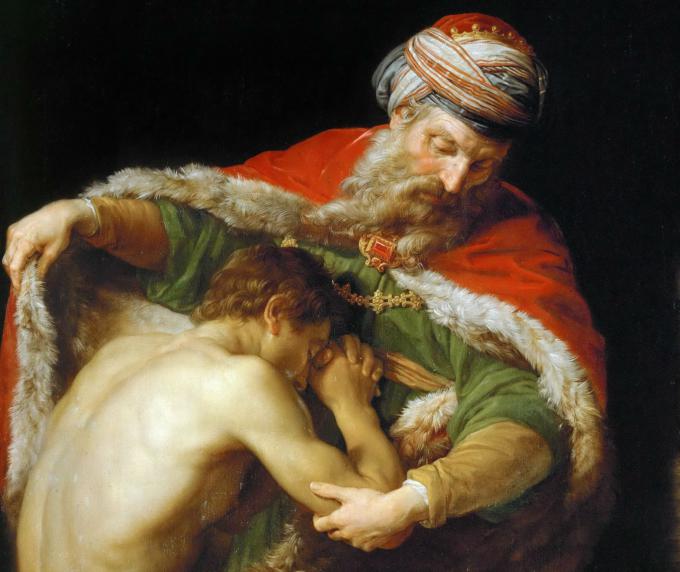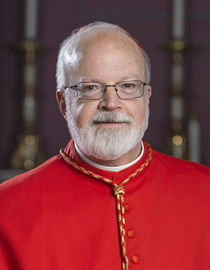
Spirituality
All of us need to know how much God loves us and wants to embrace and forgive us.

O'Malley
Below is the introduction to the Pastoral Letter "God's Mercy Runs to Meet Us" published by Cardinal Seán P. O'Malley on the occasion of the Jubulee Year of Mercy. The letter is dated April 3, 2016 to coincide with Divine Mercy Sunday. You can read the complete text at here.
Jesus is the face of the Father's mercy and love. Throughout the Gospels, Jesus taught that God's ways toward sinners and the "lost" were different from the harsh ways of the Pharisees and other leaders at the time. Jesus' acts of compassion and his teachings of the Father's mercy are the "beating heart of the Gospel."
At the beginning of his fifteenth chapter of the Gospel of Saint Luke, the evangelist writes that the Pharisees are complaining that Jesus is a friend of sinners and is eating with them. Jesus responds to their gripes by sharing three stories -- the parables of the lost sheep, the lost coin and then the lost (or prodigal) son. When what was lost is found, Jesus tells us that God and all of heaven rejoices.
The Parable of the Prodigal Son is the longest of the three narratives and in it we see a clear difference between the ways of the Father and of the world. The father in the parable has two sons. The younger son has decided that he wants to make his life without his father, and so he demands his inheritance as if his father were already dead. This is a metaphor for sin, which is when we try to live our life without God. We take all the gifts God has given us, and we resolve to use them for our own benefit and enjoyment without much thought about others' needs.
The younger son is looking for freedom; but the drama of the young man is that the more he distances himself from the father, the more his situation deteriorates. Like every human being, he longed for happiness but he settled for fun. He eventually runs out of money and begins to feel the humiliation of his circumstances. Without resources or real friends, he has been reduced to taking care of pigs. His situation was deplorable, as he had to beg for food while he was feeding the pigs, unclean animals in the Jewish religion. He eventually comes to his senses and longs to be back at his father's farm. He knows he is unworthy to be treated as a son, but would gladly work as a farm hand. He sets out to return home, practicing his lines like a young man waiting to go to confession.
Then comes the most beautiful part of the parable. The father has been waiting and searching the horizon for his younger son, hoping some day to welcome him home. When he spies his boy far off, the father is filled with compassion and races to hug him. Our repentance often walks along slowly but God's mercy runs to meet us. The father receives his lost son with such special affection and in a very public way by embracing and kissing him. Before his son has a chance to offer explanations, excuses or promises, he is received as a son. The father exchanges the son's rags for fine clothes, puts sandals on his feet and a ring on his finger. He forgives him, rejoices, and resolves immediately to host a feast celebrating his son's return.
All of us need to know how much God loves us and wants to embrace and forgive us. In the parable, the father represents our God who is able not only to satisfy the son's hunger but also restore his dignity. The older son represents the attitude of the scribes and Pharisees who often place the law and harsh judgment above the demands of love. When he returns from the fields and inquires about the music and festivities, he learns that his father is celebrating his brother's return. He refuses to enter the house for the celebration. The father sees the prodigal son with love and compassion and rejoices because he was dead and has now returned to life. The reaction of the older son is anger; he is not capable of seeing anything but his brother's sin. He feels cheated, and complains that his father has never thrown a party for him and his friends despite his loyalty and faithfulness.
Just as the father goes out to embrace the prodigal son and bring him home, he also searches for the elder son to teach him to be merciful. The father loves and forgives both sons and wants them to live in peace and harmony. The father rejoices over the conversion of the younger son and hopes for the conversion of the older, hard-working, responsible son who finds it so difficult to pardon his brother. The father explains to his elder son that he has always been with him and that all that he has remains his inheritance, but that his brother was lost and his return is worth rejoicing. The father is unconcerned about his property and his honor. He is concerned only about his sons.
The parable defines very well the mercy of God and the mission of Jesus who has come to call sinners. A better name for the story would be the "Parable of the Merciful Father" because the main message is about the father's forgiving love, not the younger son's sin. It demonstrates the connection between repentance and joy -- the joy of the repentant sinner who experiences God's loving forgiveness and also the joy that God feels in our return.
In our lives as Jesus' disciples, we also are called to two progressions illustrated by the parable. First, we are invited to "come to our senses" like the younger son if we have chosen to separate ourselves from the love of our Heavenly Father and take the steps toward being reconciled with God.
Second, during this Year of Mercy, we are also summoned to change the way we view other sinners and all those in need of mercy. Instead of seeing them like the older brother or the Pharisees did, we are invited to look at them with the eyes of the Merciful Father and to imitate God's mercy in our outreach to them.
That is why Pope Francis has chosen the theme Merciful Like the Father for this Jubilee Year of Mercy. Sin, though tragic because it leads to a separation from God and others, is not the end of the story because repentance leads to new life. When we see sinners and all those who are "lost," let us always try to lead them to this joyful path of reconciliation with the Father and the happy road to restoration within our family of faith.
This Pastoral Letter will explain how we can put into practice a life of mercy and forgiveness and the many opportunities during this Jubilee to grow in joy and become Merciful Like the Father.
You can read the complete text at www.cardinalseansblog.org/yearofmercy/
- Cardinal Seán P. O'Malley, OFM Cap. Is Archbishop of Boston
Recent articles in the Spirituality section
-
He saw the cloths and believedBishop Robert Barron
-
God's instrument for viewing the crucifixionMichael Pakaluk
-
QuinquagesimaMichael Pakaluk
-
Pro-life Christians: Now is the time to shout from the rooftopsBishop Robert Barron
-
Seeking an indulgence as an act of faithMichael Pakaluk


















